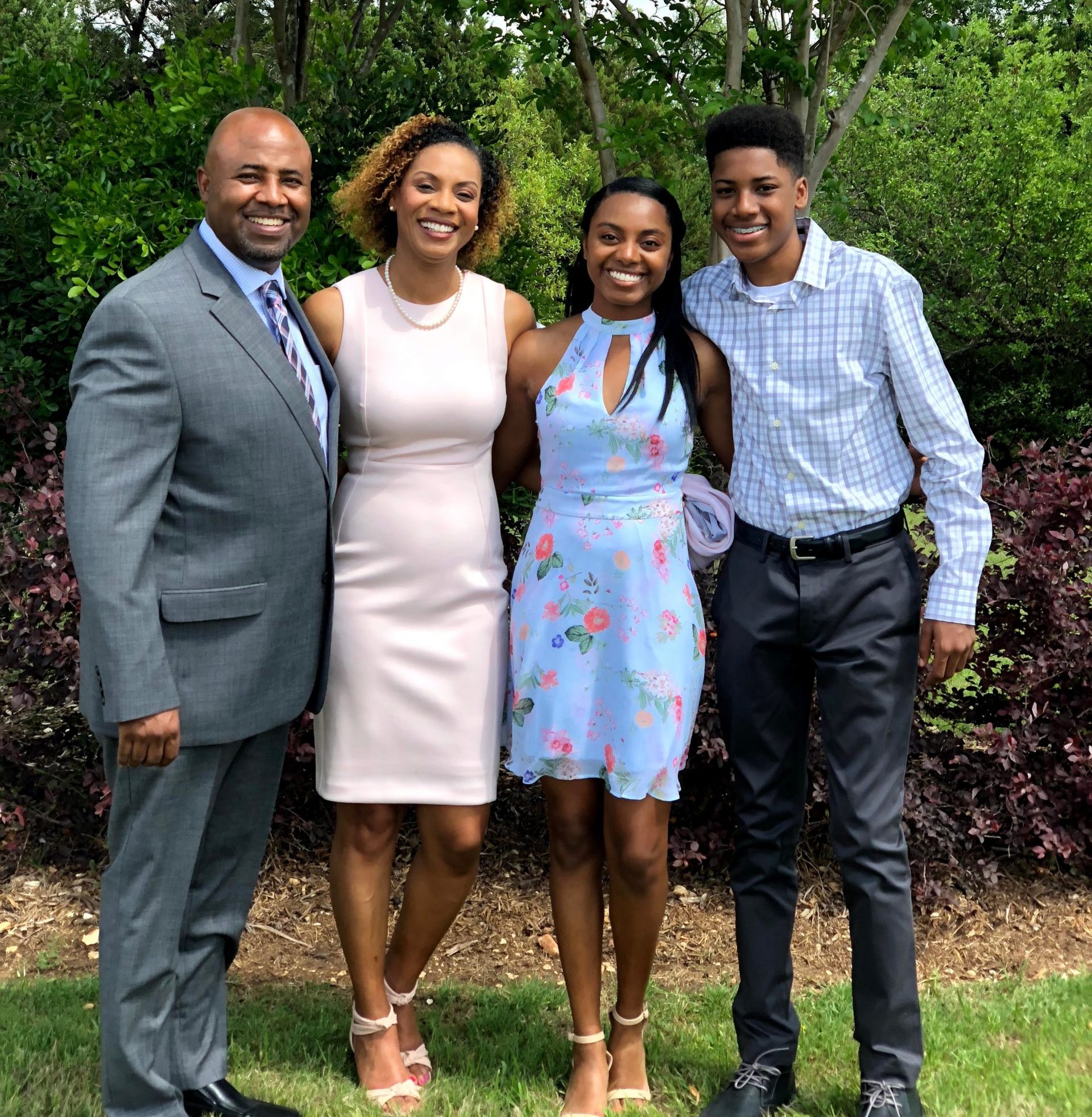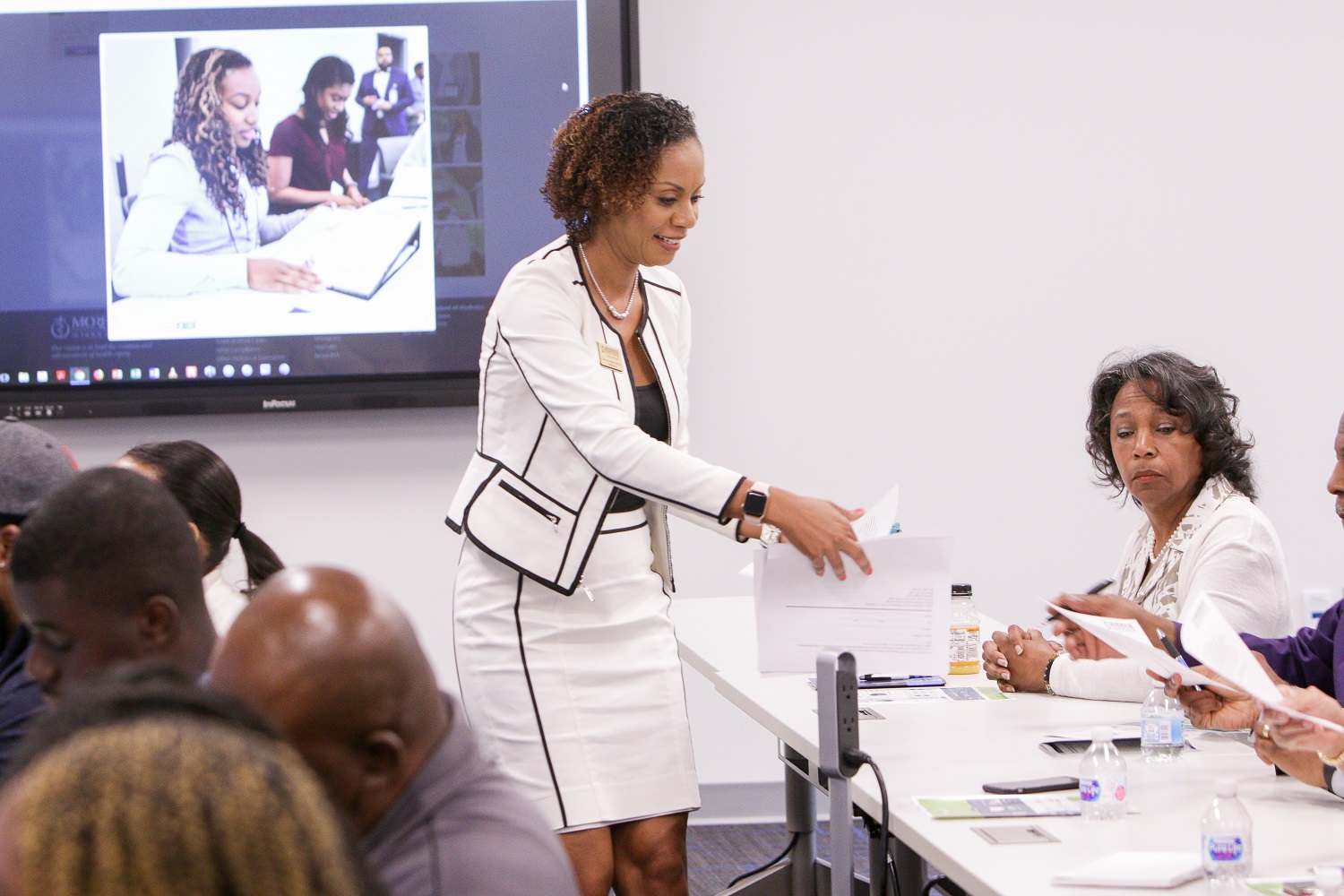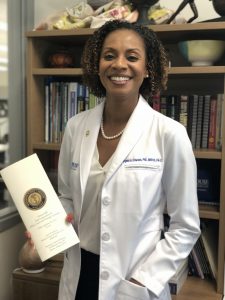Founding Morehouse Program Director Highlights Health Disparities for People of Color
Pangela Dawson Enhances the Visibility of Black Professionals in Healthcare
January 28, 2021

Calbeth Chika Alaribe, MPH, PA-S, and Lilly Khorsand, MPH, interviewed Pangela Dawson, PhD, MSPAS, PA-C, founding PA program director of Morehouse School of Medicine. Alaribe will graduate from Morehouse in 2022. Khorsand serves as communications coordinator for Women in Global Health.
By Calbeth Chika Alaribe, MPH, PA-S and Lilly Khorsand, MPH
Since childhood, Pangela Dawson’s, PhD, MS, PA-C, mother instilled in her a passion for medicine. Being surrounded by medical professionals as they took care of various family members set an early example for her too. At first, she considered a career in occupational, speech, or physical therapy. But ultimately, her true passion was to become a PA. Her educational and professional journey outlines her challenges coupled with inherited societal biases, misrepresentation, and underestimation by many individuals. Above all, the lack of a regular mentor to guide her through her leadership experiences prevented her from seeing her true potential until much later in her career. Through adversity, Dawson paved a way for the future of PAs of color, especially those who strive to work in academia. In 2019, she became the founding program director of Morehouse School of Medicine’s (MSM) PA program and in January 2021, she became assistant dean.
In a recent interview, Dawson elaborates on the unjust hierarchy of a healthcare system in which being a woman of color calls for more effort and toil to achieve the same goals as their white counterparts. She also unmasks racial biases between patient-provider interactions and its impact on Black women. Often patients question the competence and skill level of a Black physician and/or PA and opt to wait for an ethnically white or Caucasian clinician instead. However, data shows patients receive better quality care and improved health outcomes when being cared for by medical teams from diverse backgrounds1. Her experiences led her to continuously promote cultural competency in every facet of her work.
[Receive unparalleled career services and support – join or renew your membership today]
Dawson believes that healthcare teams should strive to create awareness and enhance the visibility of Black professionals in healthcare. Furthermore, professional and racial biases in workplaces should be discussed to ensure a healthy and collaborative environment between patients and medical teams. White counterparts should respect the Black community with dignity and use professionalism to eliminate very real and dire health gaps.
Dawson also emphasizes individual effort. She encourages young professionals to learn about the importance of branding oneself, to be their own spokespersons and to be vocal advocates for the success and visibility of professionals from various ethnic backgrounds. We asked Dawson the following questions to highlight her experiences.
On a scale of 1 to 10, how likely are you to see women like you in your organization/global health arena?
Dawson: At Morehouse School of Medicine – 10; in the PA field 3.

How has family influenced your career choices or trajectory?
Dawson: Family means everything to me. Although I have embraced my 20-year career journey, I’ve never been misguided and put my work before family. It’s actually been quite the opposite. I have been married for 25 years. We have two beautiful children. Our daughter is 25 and our son is 17. The secret to our success is the never-ending support we offer to one another. There have been times when I’ve almost let an opportunity pass by, and they will gently come to me and say, “Mom, you have to do this.” As I was contemplating moving to Atlanta to develop the Morehouse School of Medicine PA program, my son (then age 15) told me, “Mom, we have followed dad’s career my entire life. It’s now time that we all follow your career.” Of course, my husband is constantly in my ear telling me about all the potential he sees in me. Often, he sees it and believes it before me. That’s been the difference. The other thing that I would add is that in everything I do, I think of how it can break a barrier and allow my kids to get a little further. Research shows that the aspirations and success of children is determined by the education level of the mother. I keep going so that I will know to keep going. I want to be an example to my children, not to mention make my husband proud. We are a real, humble, and close family. We’ve named ourselves Team Dawson.
How do you think the COVID-19 pandemic influences the communities you work with on a regular basis?
Dawson: It has finally become apparent to the rest of the world that African Americans are suffering from health and healthcare disparities. We are dying younger, living poorer, and marginalized. While it’s been there in plain sight this whole time, the pandemic has uncovered the obvious. The data clearly show that Covid-19 disproportionately impacts the number of infections, complications, and deaths in African American communities. Not to mention the workers in the service industry. These individuals are often people of color. They aren’t afforded the opportunity to stay home during a national lockdown. They are required to go to work and stay on the frontline and risk their lives. The ignorant can continue to squint and pretend not to see the results that this pandemic has had on communities of color, but clearly systemic racism is at the root of what we are seeing and experiencing. America will stay sick until we all get well.
 What change would you suggest, in the COVID-19 response, to ensure disadvantaged communities, communities of color, LGBTQ, poor communities and women are reached more effectively?
What change would you suggest, in the COVID-19 response, to ensure disadvantaged communities, communities of color, LGBTQ, poor communities and women are reached more effectively?
Dawson: This is an opportunity to redistribute wealth and improve the education system. In one way, these efforts are already starting. Morehouse School of Medicine was recognized as a testing site for the nearby community to allow people of color access to COVID-19 testing. Obviously, this will help with tracing and quarantining efforts. I also think making sure PPE is readily available in our communities will help too. Federal funds like stimulus checks are also needed to support unemployment. This is necessary to limit the growth in homelessness and hunger across poor communities.
[Listen to AAPA’s Diversity, Equity and Inclusion webinar series]
Is there is a data gap about Black women leaders?
Dawson: Oh, yes, absolutely. So much so that I have a strong research interest, which is why I readily said yes to the opportunity to speak with you. I have an interest in this topic widely but also in the PA field. Only about 3% of PAs across the country are African American of all genders, out of 140,000 some individuals. It is a very unique challenge. The data also shows a salary gap similar to other sectors and industries. Mentors and coaches can teach young professionals how to negotiate, learn the skills to have those conversations, and articulate their worth and value and make a demand for a comparable salary.
What are structural changes you would suggest to bringing more visibility and leadership opportunities to minority women in your field?
Dawson: I think we need formal and informal training to develop networks, and one of the things we have to do better is to learn to brand ourselves. Often, we get busy taking care of things that need to get done, and we forget to also take care of our career. That branding would help us with visibility. I think we need to do a better job of collaborating and look for those opportunities that would bring us visibility and exposure. We have to be the spokespersons and sponsors for one another.
Is there implicit bias in patient-provider interactions and health outcomes?
Dawson: Absolutely. There’s a lot of data that speaks to that. Often for providers of color such as African American physicians or PAs (even adding gender), there are biases. Patients may question whether this person has the knowledge or the skillset to get them treatment and healing. Regarding PAs, patient education is a must. There isn’t a clear understanding of the role of the PA in the clinic. So, you will hear certain comments like, “I don’t want to see the PA, I will wait for the doctor.” I tell my team and early cohorts that their task is to get an education and become competent, compassionate PAs. At the same time we need to educate our community about what we do as PAs. Explaining our role has been necessary forever but even more so when you add implicit bias. Data shows that interprofessional care and education (where you have a team of multiple practitioners from multiple backgrounds) improve patient outcomes, compliance, and overall outcomes in patient disorder or illness.
Does ethnic representation make a difference when working in the health field?
Dawson: Absolutely. When you can relate to someone, you can build the patient’s level of trust from the beginning; then, you don’t necessarily face as many barriers to develop the right relationship for them to believe and trust you. I always tell our students that it is a partnership in how you care for your patients. Without taking time to discuss treatment preferences and plans, you’re not going to get very far with improving a patient’s overall health. If we share commonalities with our patients, whether its gender or race or religion, that’s what you can tap into to move things along and make sure the patient is compliant and trusts you. This is even more important as a PA. Our mission is to improve rural health outcomes, so students from rural areas can go back to their communities and relate to their communities and traditions.

What are some structural changes you would like to see in your field as a Black woman leader to improve the health outcomes of communities of color?
Dawson: I am a massive supporter of advocating for people of color, including African Americans. That is who I am through and through, so I think it’s such a reward when someone crosses the finish line. I want to help create a workforce that can highlight the misperceptions about African Americans and African American women who need pain treatment. My dissertation focused on violence against women, specifically African American women, and advocating and teaching informal community networks about how to advocate for themselves. It looked at women who had chronic pain secondary to abuse. If we’re able to increase the workforce of practitioners and providers from African American communities and women, then we can begin to advocate for those women needing a specific type of care. This will aid in the underlying goal of advancing health equity. If I am in the field, and I know in fact that this woman is not hysterical, that her pain is real, I can give her the care that she needs. I’m not relying on one specific gender or race to give her the care she needs. Secondly, we need to teach our counterparts that this is real. When African Americans are prescribed treatment for pain and other illnesses, we are less likely to receive it. We need to teach and talk to our counterparts about this gap and we can find a way to close it.
If you could have a billboard/one liner for other women leaders – what would it say?
Dawson: “But what if I fail? Oh, but my darling, what if you fly?” When opportunity arises, face your fears, and let go of your regrets.
Contact the authors, Calbeth Chika Alaribe, at [email protected] and Lilly Khorsand at [email protected].
References
1 Gomez, L. E., & Bernet, P. (2019). Diversity improves performance and outcomes. Journal of the National Medical Association, 111(4), 383–392. https://doi.org/10.1016/j.jnma.2019.01.006. Accessed online 1/5/21.
You May Also Like
The Role of Social Determinants of Health in Clinical Practice and Subsequent Health Outcomes
PAs and Social Determinants of Health: 4 Things to Know
Charting CME on Health Disparities Leads to Positive Changes in PA Practice
Thank you for reading AAPA’s News Central
You have 2 articles left this month. Create a free account to read more stories, or become a member for more access to exclusive benefits! Already have an account? Log in.



